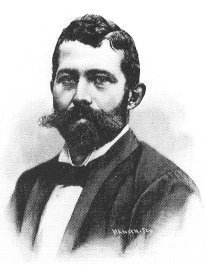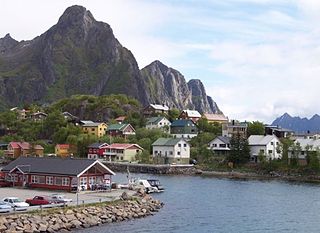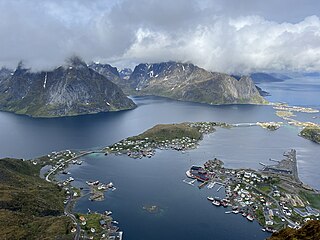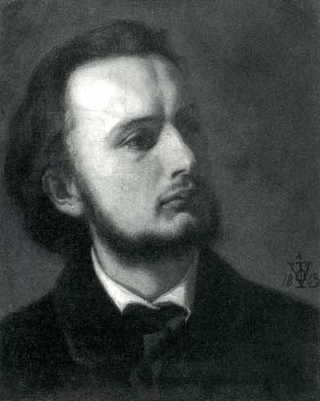
Gunnar Berg (21 May 1863 – 23 December 1893) was a Norwegian painter, known for his paintings of his native Lofoten. He principally painted memorable scenes of the everyday life of the local fishermen. [1] [2] [3] [4]
Contents



Gunnar Berg (21 May 1863 – 23 December 1893) was a Norwegian painter, known for his paintings of his native Lofoten. He principally painted memorable scenes of the everyday life of the local fishermen. [1] [2] [3] [4]


Gunnar Berg was born on Svinøya in Svolvær on Lofoten, Nordland County, Norway. He was the oldest of 12 siblings born to a wealthy landowner and merchant, Lars Thodal Walnum Berg (1830-–1903) and Lovise Johnsen (1842–1921). From 1875 until 1881, he attended Trondheim Cathedral School, and also took private lessons in drawing and painting by the artist H.J. Nicolaysen. He later attended a trade school in Bergen. He was first employed as a merchant. He later studied to become an artist. [5]
Gunnar Berg first studied at the art academy in Düsseldorf, Germany. From 1883 until his death, Gunnar Berg studied and worked in Düsseldorf and Berlin, associated with the Düsseldorf school of painting. During the Lofoten fishing season, Berg was at home in Svolvær. With the help of his parents, built a studio on Svinøya. When he was at Lofoten, he had a good collaboration with fellow painter Otto Sinding. [6]
Berg painted scenes from his hometown including both landscapes and seascapes. Fishermen, mountains and the sea, during both summer and winter, comprised the primary themes of his artistry. [6]
Among his most significant paintings are Fra Vaterfjord (1886) which is now on display at Svolvær City Hall and Trollfjordslaget (1890) which is situated in the Gunnar Berg Gallery in Svolvær. Fra Vaterfjord is dated to between 1886 and 1893. The painting features Nordland boats during a break in fishing. In the background is a steamship that is probably buying up fish for transport south. [3]
Trollfjordslaget depicts The Battle of Trollfjord which was fought in 1890. The Battle at Trollfjord (Slaget i Trollfjorden) was fought between the owners of large steamships and some Lofotfisherman over the control of local fishing. [3]
Trollfjordslaget was Gunnar Berg's last major work. In 1891 it was discovered that he had cancer in one leg that had to be amputated. His health was weakening and during the fall of 1893 he incurred pneumonia. [3]
Gunnar Berg died in Berlin in 1893. His grave is in the family's chapel on the Island of Gunnarholmen in Svolvaer. A bust of him was erected there in 1994. [7]

Vågan is a municipality in Nordland county, Norway. It is part of the traditional district of Lofoten. The administrative centre of the municipality is the town of Svolvær. Some of the villages in Vågan include Digermulen, Gimsøysand, Gravermarka, Henningsvær, Hopen, Kabelvåg, Kleppstad, Laupstad, Liland, Skrova, Straumnes, and Sydalen.

Lofoten is an archipelago and a traditional district in the county of Nordland, Norway. Lofoten has distinctive scenery with dramatic mountains and peaks, open sea and sheltered bays, beaches and untouched lands. There are two towns, Svolvær and Leknes – the latter is approximately 169 km (105 mi) north of the Arctic Circle and approximately 2,420 km (1,500 mi) away from the North Pole. The archipelago experiences one of the world's largest elevated temperature anomalies relative to its high latitude.

is a town in Nordland county, Norway. The town is also the administrative centre of the municipality of Vestvågøy. Leknes was designated a "town" in 2002. The 2.52-square-kilometre (620-acre) town has a population (2018) of 3,556 which gives the town a population density of 1,411 inhabitants per square kilometre (3,650/sq mi).

Adolph Tidemand was a noted Norwegian romantic nationalism painter. Among his best known paintings are Haugianerne and Brudeferd i Hardanger, painted in collaboration with Hans Gude.

Kabelvåg is a village in Vågan Municipality in Nordland county, Norway. It is located on the southern shore of the island of Austvågøya in the Lofoten archipelago. Kabelvåg lies about 5 kilometres (3.1 mi) to the southwest of the town of Svolvær, the administrative centre of Vågan municipality. The 1.13-square-kilometre (280-acre) village has a population (2018) of 1,883 which gives the village a population density of 1,666 inhabitants per square kilometre (4,310/sq mi).

Reine is the administrative centre of Moskenes Municipality in Nordland county, Norway. The fishing village is located on the island of Moskenesøya in the Lofoten archipelago, above the Arctic Circle, about 300 kilometres (190 mi) southwest of the city of Tromsø. Reine Church is located here and it serves the northern part of the municipality.

Frits Thaulow was a Norwegian Impressionist painter, best known for his naturalistic depictions of landscape.

Amaldus Clarin Nielsen was a Norwegian painter.

The Trollfjord or Trollfjorden is a fjord in Hadsel Municipality in Nordland county, Norway. The 2-kilometre (1.2 mi) long fjord cuts into the island of Austvågøya and flows out into the Raftsundet strait. The fjord has a narrow entrance and steep-sided mountains surrounding it. The name is derived from troll, a figure from Norse mythology.

Gudmund Stenersen was a Norwegian painter and illustrator.

Eilert Adelsteen Normann was a Norwegian painter who worked in Berlin. He was a noted painter of landscapes of Norway. Normann was the artist who invited Edvard Munch to Berlin, where he painted The Scream. Normann's fjord paintings are credited with making the Norwegian fjords a more popular tourist destination.

Johan Fredrik Eckersberg was a Norwegian painter most noted for his landscapes. Eckersberg was a prominent figure in the transition from Romanticism to Realism in 19th-century Norwegian art, both as an artistic painter and a teacher at his own art school in Oslo.
Joakim Jan Aril "Jack" Berntsen was a Norwegian philologist, songwriter and folk singer.

Morten Müller was a Norwegian landscape painter.

Frants Diderik Bøe was a Norwegian painter, who specialized in still life and landscapes.

Skomvær was the name of a steel-hulled barque built in 1890 for J. C. & G. Knudsen in Porsgrunn, Telemark, Norway. The ship, which was designed by naval architect Randulf Hansen and constructed at Laxevaags Maskin- og Jernskibsbyggeri in Bergen, was the first sailing ship constructed with steel in Norway and for a time the largest Norwegian sailing vessel ever built. However, the ship struggled to compete in the 20th century with the advent of the steamship, and in 1924 she was decommissioned and sold for scrap.

Agnes Steineger was a Norwegian painter.

Hans Olaf Halvor Heyerdahl was a Norwegian Realist painter. His work was characterized by naturalism and focused largely on portraits and landscape paintings.

Karl Uchermann was a Norwegian painter and illustrator. He is best known for his portraits of animals, in particular dogs. He also painted altarpieces, and is credited for designing the world's first franking machine in 1901.
Even Ulving was a Norwegian painter.